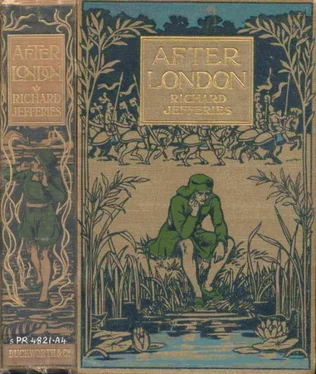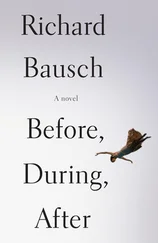Richard Jefferies - After London
Здесь есть возможность читать онлайн «Richard Jefferies - After London» весь текст электронной книги совершенно бесплатно (целиком полную версию без сокращений). В некоторых случаях можно слушать аудио, скачать через торрент в формате fb2 и присутствует краткое содержание. Город: London, Год выпуска: 1905, Издательство: Duckworth & Co., Жанр: sf_postapocalyptic, на английском языке. Описание произведения, (предисловие) а так же отзывы посетителей доступны на портале библиотеки ЛибКат.
- Название:After London
- Автор:
- Издательство:Duckworth & Co.
- Жанр:
- Год:1905
- Город:London
- ISBN:нет данных
- Рейтинг книги:4 / 5. Голосов: 1
-
Избранное:Добавить в избранное
- Отзывы:
-
Ваша оценка:
- 80
- 1
- 2
- 3
- 4
- 5
After London: краткое содержание, описание и аннотация
Предлагаем к чтению аннотацию, описание, краткое содержание или предисловие (зависит от того, что написал сам автор книги «After London»). Если вы не нашли необходимую информацию о книге — напишите в комментариях, мы постараемся отыскать её.
(1885), set in a future in which urban civilization has collapsed after an environmental crisis.” (From
).
This eBook is for the use of anyone anywhere at no cost and with almost no restrictions whatsoever. You may copy it, give it away or re-use it under the terms of the Project Gutenberg License included with this eBook or online at
* * *
After London — читать онлайн бесплатно полную книгу (весь текст) целиком
Ниже представлен текст книги, разбитый по страницам. Система сохранения места последней прочитанной страницы, позволяет с удобством читать онлайн бесплатно книгу «After London», без необходимости каждый раз заново искать на чём Вы остановились. Поставьте закладку, и сможете в любой момент перейти на страницу, на которой закончили чтение.
Интервал:
Закладка:
He returned towards Oliver, thoughtful and not without some anxiety, for he did not like the idea (though there was really little or no danger) of these human wild beasts being so near Aurora, while he should so soon be far away. Thus occupied he did not heed his steps, and suddenly felt something soft under his feet, which struggled. Instantaneously he sprang as far as he could, shuddering, for he had crushed an adder, and but just escaped, by his involuntary and mechanical leap, from its venom.
In the warm sunshine the viper, in its gravid state, had not cared to move as usual on hearing his approach; he had stepped full upon it. He hastened from the spot, and rejoined Oliver in a somewhat shaken state of mind. Common as such an incident was in the woods, where sandy soil warned the hunter to be careful, it seemed ominous that particular morning, and, joined with the discovery of Bushman traces, quite destroyed his sense of the beauty of the day.
On hearing the condition of the willow boughs Oliver agreed as to the cause, and said that they must remember to warn the Baron’s shepherds that the Bushmen, who had not been seen for some time, were about. Soon afterwards they emerged from the sombre firs and crossed a wide and sloping ground, almost bare of trees, where a forest fire last year had swept away the underwood. A verdant growth of grass was now springing up. Here they could canter side by side. The sunshine poured down, and birds were singing joyously. But they soon passed it, and checked their speed on entering the trees again.
Tall beeches, with round smooth trunks, stood thick and close upon the dry and rising ground; their boughs met overhead, forming a green continuous arch for miles. The space between was filled with brake fern, now fast growing up, and the track itself was green with moss. As they came into this beautiful place a red stag, startled from his browsing, bounded down the track, his swift leaps carried him away like the wind; in another moment he left the path and sprang among the fern, and was seen only in glimpses as he passed between the beeches. Squirrels ran up the trunks as they approached; they could see many on the ground in among the trees, and passed under others on the branches high above them. Woodpeckers flashed across the avenue.
Once Oliver pointed out the long, lean flank of a grey pig, or fern-hog, as the animal rushed away among the brake. There were several glades, from one of which they startled a few deer, whose tails only were seen as they bounded into the underwood, but after the glades came the beeches again. Beeches always form the most beautiful forest, beeches and oak; and though nearing the end of their journey, they regretted when they emerged from these trees and saw the castle before them.
The ground suddenly sloped down into a valley, beyond which rose the Downs; the castle stood on a green isolated low hill, about half-way across the vale. To the left a river wound past; to the right the beech forest extended as far as the eye could see. The slope at their feet had been cleared of all but a few hawthorn bushes. It was not enclosed, but a neatherd was there with his cattle half a mile away, sitting himself at the foot of a beech, while the cattle grazed below him.
Down in the valley the stockade began; it was not wide but long. The enclosure extended on the left to the bank of the river, and two fields on the other side of it. On the right it reached a mile and a half or nearly, the whole of which was overlooked from the spot where they had passed. Within the enclosures the corn crops were green and flourishing; horses and cattle, ricks and various buildings, were scattered about it. The town or cottages of the serfs were on the bank of the river immediately beyond the castle. On the Downs, which rose a mile or more on the other side of the castle, sheep were feeding; part of the ridge was wooded and part open. Thus the cultivated and enclosed valley was everywhere shut in with woods and hills.
The isolated round hill on which the castle stood was itself enclosed with a second stockade; the edge of the brow above that again was defended by a stout high wall of flints and mortar, crenellated at the top. There were no towers or bastions. An old and ivy-grown building stood inside the wall; it dated from the time of the ancients; it had several gables, and was roofed with tiles. This was the dwelling-house. The gardens were situated on the slope between the wall and the inner stockade. Peaceful as the scene appeared, it had been the site of furious fighting not many years ago. The Downs trended to the south, where the Romany and the Zingari resided, and a keen watch was kept both from the wall and from the hills beyond.
They now rode slowly down the slope, and in a few minutes reached the barrier or gateway in the outer stockade. They had been observed, and the guard called by the warden, but as they approached were recognised, and the gate swang open before them. Walking their horses they crossed to the hill, and were as easily admitted to the second enclosure. At the gate of the wall they dismounted, and waited while the warden carried the intelligence of their arrival to the family. A moment later, and the Baron’s son advanced from the porch, and from the open window the Baroness and Aurora beckoned to them.
CHAPTER VIII
THYMA CASTLE
Soon afterwards the hollow sound of the warden’s horn, from the watch over the gate of the wall, proclaimed the hour of noon, and they all assembled for dinner in the banqueting chamber. The apartment was on the ground floor, and separated from the larger hall only by an internal wall. The house, erected in the time of the ancients, was not designed for our present style of life; it possessed, indeed, many comforts and conveniences which are scarcely now to be found in the finest palaces, but it lacked the breadth of construction which our architects have now in view.
In the front there were originally only two rooms, extensive for those old days, but not sufficiently so for ours. One of these had therefore been enlarged, by throwing into it a back room and part of the entrance, and even then it was not long enough for the Baron’s retainers, and at feast-time a wooden shed was built opposite, and up to the window, to continue, as it were, the apartment out of doors. Workmen were busy putting up this shed when they arrived.
The second apartment retained its ancient form, and was used as the dining-room on ordinary days. It was lighted by a large window, now thrown wide open that the sweet spring air might enter, which window was the pride of the Baroness, for it contained more true glass than any window in the palace of the Prince. The glass made now is not transparent, but merely translucent; it indeed admits light after a fashion, but it is thick and cannot be seen through. These panes were almost all (the central casement wholly) of ancient glass, preserved with the greatest care through the long years past.
Three tables were arranged in an open square; the Baron and Baroness’s chairs of oak faced the window, the guests sat at the other tables sideways to them, the servants moved on the outer side, and thus placed the food before them without pushing against or incommoding them. A fourth table was placed in a corner between the fireplace and the window. At it sat the old nurse, the housekeeper (frequently arising to order the servants), and the Baron’s henchman, who had taught him to ride, but now, grey and aged, could not mount himself without assistance, and had long ceased from active service.
Already eight or nine guests had arrived besides Felix and Oliver. Some had ridden a great distance to be present at the House Day. They were all nobles, richly dressed; one or two of the eldest were wealthy and powerful men, and the youngest was the son and heir of the Earl of Essiton, who was then the favourite at Court. Each had come with his personal attendants; the young Lord Durand brought with him twenty-five retainers, and six gentlemen friends, all of whom were lodged in the town, the gentlemen taking their meals at the castle at the same time as the Baron, but, owing to lack of room, in another apartment by themselves. Durand was placed, or rather, quietly helped himself to a seat, next to the Lady Aurora, and of all the men there present, certainly there was none more gallant and noble than he.
Читать дальшеИнтервал:
Закладка:
Похожие книги на «After London»
Представляем Вашему вниманию похожие книги на «After London» списком для выбора. Мы отобрали схожую по названию и смыслу литературу в надежде предоставить читателям больше вариантов отыскать новые, интересные, ещё непрочитанные произведения.
Обсуждение, отзывы о книге «After London» и просто собственные мнения читателей. Оставьте ваши комментарии, напишите, что Вы думаете о произведении, его смысле или главных героях. Укажите что конкретно понравилось, а что нет, и почему Вы так считаете.












